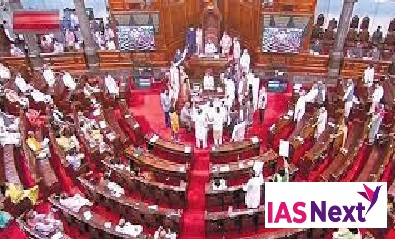CURRENT AFFAIRS
Get the most updated and recent current affair content on Padhaikaro.com
Disruptions in Parliament
- IAS NEXT, Lucknow
- 30, Nov 2021

Reference News:
Floor leaders of the Rajya Sabha have expressed concern over the Chief Justice of India’s recent remarks on Disruptions in Parliament.
- The floor leaders said it is for the Presiding Officers to take appropriate action if the norms of functioning are being violated in the legislatures, and other constitutional agencies should not comment adversely.
What’s the issue?
Chief Justice N.V. Ramana recently complained about a lack of debate in Parliament. He said it is a “sorry state of affairs” and that absence of quality debate leaves many aspects of the laws unclear, increasing the burden on the court.
What next?
Such comments should be viewed in the context of the functioning of legislatures marked by persistent disruptions, unruly behaviour and violent actions which have deleterious effects.
- The best way to counter them is to ensure proper functioning of the legislatures by ensuring their dignity and decorum since such comments are finding resonance with the public from what they see about the functioning of the legislatures.
What’s the main concern now?
Disruption is replacing discussion as the foundation of our legislative functioning.
- A PRS (PRS Legislative Research) report says during the 15th Lok Sabha (2009-14), frequent disruptions of Parliamentary proceedings have resulted in the Lok Sabha working for 61% and Rajya Sabha for 66% of its scheduled time.
- Another PRS report said, the 16th Lok Sabha (2014-19) lost 16% of its scheduled time to disruptions, better than the 15th Lok Sabha (37%), but worse than the 14th Lok Sabha (13%).
- The Rajya Sabha lost 36% of its scheduled time. In the 15th and 14th Lok Sabhas, it had lost 32% and 14% of its scheduled time respectively.
Reasons for Disruption:
- Discussion on Matters of Controversy and Public Importance.
- Disruptions May Help Ruling Party Evade Responsibility.
- Lack of Dedicated Time for Unlisted Discussion.
- Scarce Resort to Disciplinary Powers.
- Party Politics.
What needs to be done?
- To curb disorder in Parliament there is a need for strict enforcement of code of conduct for MPs and MLAs.
- The Chairperson should suspend MPs not following such codes and obstructing the Houses’ business.
- The government of the day needs to be more democratic and allow the opposition to put their ideas in free manner.
- A “Productivity Meter” could be created which would take into consideration the number of hours that were wasted on disruptions and adjournments and monitor the productivity of the day-to-day working of both Houses of Parliament.